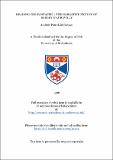Reading the fantastic : the narrative fiction of Barbey d'Aurevilly
Abstract
Although Barbey's handling of the Fantastic has certainly not been overlooked, studies tend to examine this subject from a conceptual or thematic perspective. This has left unexplored the relationship between the Fantastic and Barbey's way of writing; this study aims to fill that gap by offering a stylistic analysis of the Fantastic. The thesis approaches the question by first attempting to define how the Fantastic works, and concludes by proposing the principle of a dynamic flux between writing of the real and the unreal. From this premise, the study of Barbey's Fantastic questions first the presence of realist discourse in the texts, and offers a critique of the traditional view which suggests that Barbey borrows from nineteenth-century realist orthodoxy. In its place, a broader form of mimesis is proposed. Following this, the thesis examines how Barbey's fiction works at counterpoint to the mimetic code, undermining and destabilising the illusion of vraisemblance. In so doing, the peculiarities of narrative technique are promoted as germane to the voicing of textual doubt. Then, Barbey's rhetoric is considered, offering a reading of how verbal exorbitance weakens the relationship with the signified. After this, Barbey's attempts to re-write differences are examined, a trend which provokes a crisis in the differential foundations of human understanding. The thesis concludes by examining how these principles work within the nouvelle Léa. This discussion indicates how the Fantastic demands to be read as a whole textual entity and not as a sporadic mode, and suggests that it is only in endless and unchecked interpretation- reading- that the meaning of the Fantastic is to be grasped.
Type
Thesis, PhD Doctor of Philosophy
Collections
Items in the St Andrews Research Repository are protected by copyright, with all rights reserved, unless otherwise indicated.

